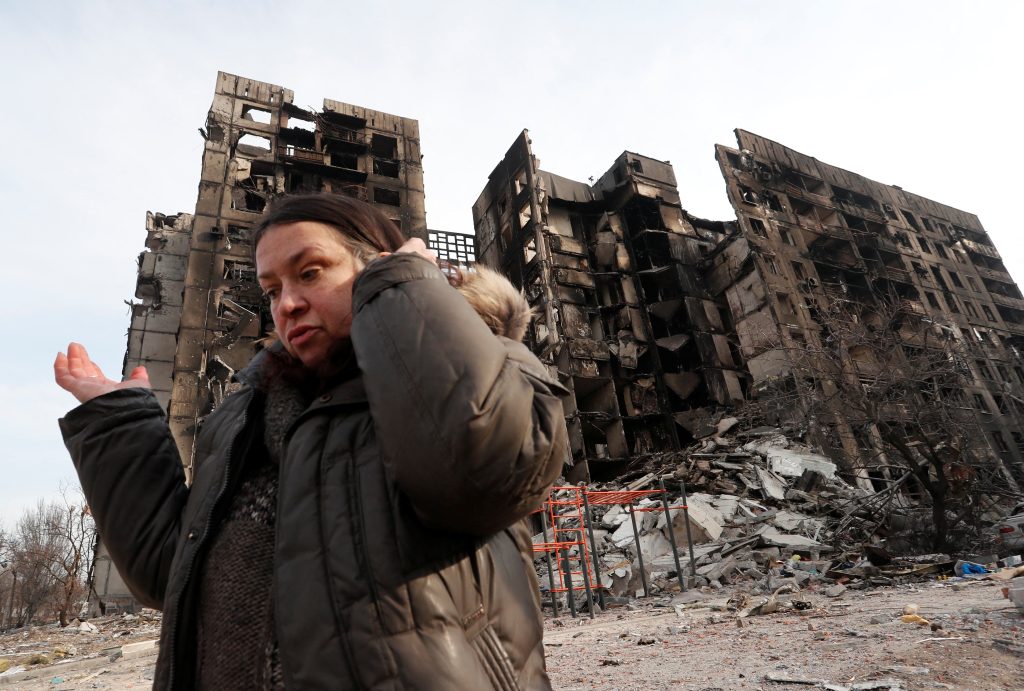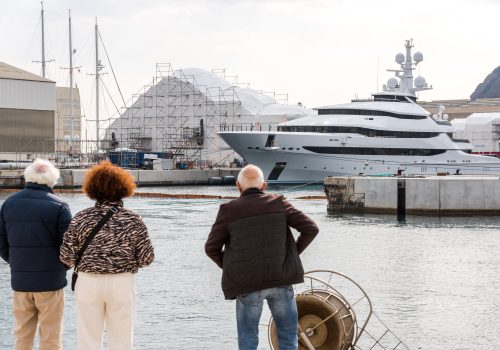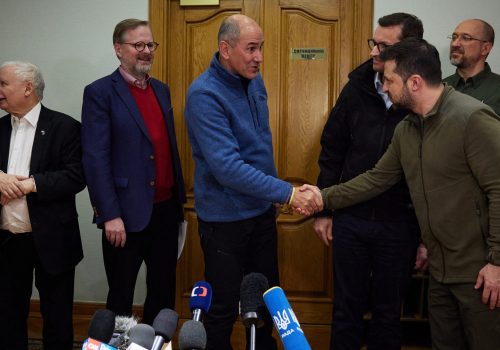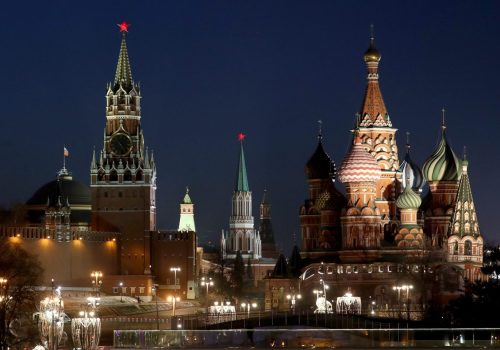As the sound of gunfire echoes across a surrounded Mariupol and horrific Russian attacks continue across Ukraine, the international community has united in condemning Russian President Vladimir Putin’s invasion and punishing him and his cronies. But there’s more to be done, and one way to maximize the impact of these global efforts would be an interparliamentary alliance against Kremlin aggression (IPAKA).
Putin’s invasion of Ukraine has forced the Group of Seven (G7), NATO members, and their major partners into soul searching about how they could have turned a blind eye to the Russian leader’s authoritarian and kleptocratic tendencies. Some of these countries, for example, accommodated the Kremlin’s and oligarchs’ offshoring of wealth into their jurisdictions despite indications that this wealth had been stolen from the Russian public.
But now, the United States and its allies are scrambling for more economic measures to drain Putin’s war chest, employing coordinated sanctions aimed at the economic foundations of Russia’s invasion. These allies’ coordination on sanctions has been impressive so far, especially compared to their disjointed responses against Russian aggression in Crimea and the Donbas in 2014. The G7 members and Australia even launched a multilateral anti-oligarch task force to mount further pressure on the Kremlin.
But to keep up this momentum, legislative bodies across G7 countries, NATO members, and major partners should coordinate sanctions. That is because a lack of coordination in 2014 allowed the Kremlin to maintain offshoring networks in some jurisdictions and actively contributed to Russian aggression today by not imposing sufficiently strong economic deterrence measures. For example, Britain and the European Union only solidified the legal basis for imposing sanctions on authoritarian regimes guilty of systemic human-rights abuses (modeled after the US Magnitsky Human Rights Accountability Act) in 2018 and 2020 respectively; the absence of that legal basis was a factor in preventing comprehensive transatlantic sanctions coordination in response to Russia’s invasion of Crimea and the Donbas. Now that an international anti-invasion coalition is forming, there is a clear desire for sanctions coordination in legislatures around the world.
Coordinating legislation that authorizes sanctions against Russia would help circumvent delays like the ones seen in 2014 and would intensify pressure on Russia. It would also help develop a medium-to-long-term strategy to address Putin’s aggression. Legislators staying in contact with each other would also ensure that democratic countries that are against the invasion can encourage each other to maintain sanctions, rather than breaking ranks and lifting sanctions on the Kremlin earlier than other countries.
The key to coordinating that legislation is an IPAKA. Modeled on the Inter-Parliamentary Alliance on China (IPAC), an IPAKA would help the G7, NATO members, and their major partners develop similar sanctions regimes in their respective jurisdictions so that there is a legal basis for continued economic action against Russian aggression. Otherwise, there is a risk of uneven enforcement across jurisdictions that could open loopholes for sanctioned targets to exploit while those sanctions designations remain in effect. An IPAKA would ensure that internationally coordinated sanctions against Russian aggression could have greater impact, both in terms of geographic and economic reach, and in keeping the timing consistent among countries’ responses. An IPAKA would likewise keep legislative discussions on Russia politically consistent within and between jurisdictions, such as by providing new studies on Russia that legislators from around the world could access.
This group would reach far beyond the usual suspects in the West. Membership in IPAKA should be extended to legislators from the Group of Twenty (G20) like Mexico and Indonesia, as well as from less-developed countries like Kenya which have strongly condemned Russian aggression.
Additionally, an IPAKA would further enable greater sanctions coordination on Belarus for supporting the Russian military’s invasion of Ukraine. There is already precedent for this, as Belarusian state companies and senior government officials were sanctioned by the G7 for their support for the Russian invasion of Ukraine.
Miriam Lexmann, a member of the European Parliament and a founder and co-chair of IPAC, also voiced interest in supporting a similar legislative alliance on Russia during an event hosted by the Atlantic Council. IPAC provides a valuable example of success. For example, Australian members of IPAC were part of the push for Magnitsky-style legislation in their country after IPAC members across the world committed to passing similar legislation in their own countries. IPAC members consult with each other and share studies on engagement with China, which further shapes consensus among democratic countries on how to develop China policies.
As the situation grows increasingly dire in Ukraine and most democratic countries continue to target Putin’s war chest, the need for an IPAKA is clearer than ever. To grind Russia’s war machine to a halt, legislators will need to take coordinated steps to support their governments’ abilities to react swiftly to Russian aggression.
Francis Shin is a research assistant in the Atlantic Council’s Europe Center. Previously he was a research assistant at the Future of Financial Intelligence Sharing program, a research partnership with the Royal United Services Institute’s Centre for Financial Crime and Security Studies.
Riho Terras is a member of the European Parliament and head of the European People’s Party Group National Delegation for Estonia. He is also a former chief of defense of Estonia.
Further reading
Wed, Mar 9, 2022
What’s left to sanction in Russia? Wallets, stocks, and foreign investments.
New Atlanticist By Brian O’Toole, Daniel Fried
There are still some tools left for the West to escalate sanctions against Russia in response to its aggression against Ukraine—including an Iran-style approach.
Wed, Mar 30, 2022
Central Europe leads the way in backing Ukraine. Here’s its game plan for what’s next.
New Atlanticist By Petr Tůma
The European Union’s eastern members have an opportunity to prove their political and diplomatic mettle—and they're seizing it.
Wed, Feb 23, 2022
Time to go after the Kremlin’s wallets
UkraineAlert By Doug Klain
Going after the Kremlin’s oligarchs who stash their illicit wealth in the West is an essential move that should happen now before Putin goes further in his campaign to end Ukrainian independence and revise Europe as we know it today.
Image: Nurse Svetlana Savchenko, 56, stands next to the building, destroyed during Ukraine-Russia conflict, where her apartment was located in the besieged southern port city of Mariupol, Ukraine on March 30, 2022. (Photo by Alexander Ermochenko/Reuters.)



